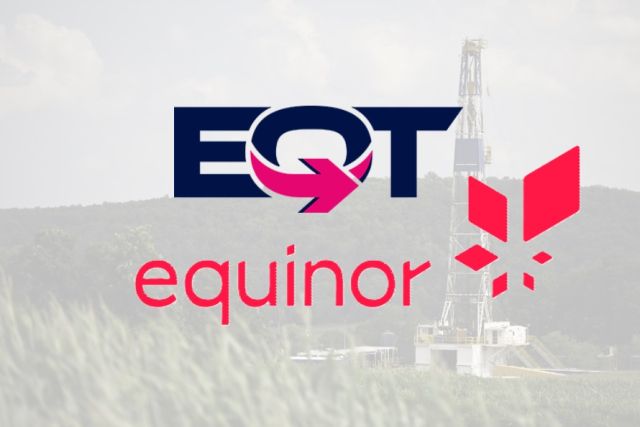
The overall terms of the deal stipulate that EQT will sell 40% of its interest in non-operated natural gas assets in northeast Pennsylvania to Equinor, according to a press release from EQT. (Source: Shutterstock/ EQT Corp./ Equinor ASA)
Swapping Appalachian acreage with Equinor allows EQT to deleverage some of its debt and take more control in the region, analysts said after both companies announced the deal on April 15.
Capital One energy analyst Brian Velie wrote that the deal terms and proceeds were “very positive” for EQT in a report on the transaction.
Equinor (EQNR), in turn, made a strategic decision to move away from an onshore operator model in the U.S., while still holding onto some U.S. interests outside of operatorship, Ajay Bakshani, director of analytics at East Daley Analytics, wrote in an email to Hart Energy.
The overall terms of the deal stipulate that EQT will sell 40% of its interest in non-operated natural gas assets in northeast Pennsylvania to Equinor, according to a press release from EQT. In exchange, Equinor will give EQT its Appalachian Basin asset and $500 million in cash.
A non-operating position allows companies to profit from an asset without handling the drilling or other associated on-the-ground tasks.
The deal includes a gas buy-back agreement, in which Equinor will purchase EQT gas at a premium to in-basin pricing until the first quarter of 2028.
For EQT, the move reflects a more active strategy in all aspects of its business, Bakshani said. In March, the company announced a merger with its old midstream unit Equitrans (ETRN) in a $5.45 billion deal.
“The transaction underscores the same strategy that led EQT to acquire ETRN: Integration that gives them more control and flexibility over production and pricing by swapping for non-operated acreage for operated acreage and securing a premium (to in-basin) price via the gas buy-back agreement,” Bakshani said.
EQT CEO Toby Rice has publicly stated that the company was considering modifying its asset base, securities firm TD Cowen noted in a report on the transaction. After announcing the merger with Equitrans, EQT was holding about $14 billion debt, pro forma.
“The company identified a path for near-term deleveraging of roughly $5 billion, of which $3.5 billion would be via asset sales,” according to TD Cowen’s analysis. EQT’s management noted at the time that coming divestitures would include regulated ETRN assets, possibly the Mountain Valley Pipeline (MVP), as well as non-op assets.
Equitrans is still the lead partner in the joint venture building the MVP, expected to be finished during the second quarter of 2024. The properties included in the swap contain some high-producing acres in the Southwest Marcellus, which could then be used to fulfill EQT’s capacity commitments on the MVP, Bakshani said.
“Overall, the swap gives EQT more control of its production and acreage and further integrates its production with ETRN’s midstream assets,” he said.
Equinor was also a “motivated seller” in the transaction, Velie wrote. The Norwegian company is able to exit all of its operated onshore positions in the U.S., reduce its well break-even price and reduce the company’s overall carbon emissions.
Bakshani said the move was more strategic for Equinor and did not necessarily relate to the current low prices in the U.S. natural gas market, trading at $1.69 per MMBtu on the Henry Hub futures market on the day the deal was announced.
“2023 and certainly 2024 have been tough years, but you can’t ignore the wave of LNG that is expected to come online in (the second half of 2024) through 2026,” he said. “The fact that EQNR did a swap and still retains exposure to the U.S. gas markets indicates they still want that exposure.”
Recommended Reading
US Drillers Cut Oil, Gas Rigs for First Time in Six Weeks
2025-01-10 - The oil and gas rig count fell by five to 584 in the week to Jan. 10, the lowest since November.
US Drillers Add Oil, Gas Rigs for First Time in Eight Weeks
2025-01-31 - For January, total oil and gas rigs fell by seven, the most in a month since June, with both oil and gas rigs down by four in January.
US Drillers Cut Oil, Gas Rigs to Lowest Since December 2021, Baker Hughes Says
2025-01-17 - The oil and gas rig count fell by four to 580 in the week to Jan. 17.
Baker Hughes: US Drillers Keep Oil, NatGas Rigs Unchanged for Second Week
2024-12-20 - U.S. energy firms this week kept the number of oil and natural gas rigs unchanged for the second week in a row.
US Oil, Gas Rig Count Falls to Lowest Since Dec 2021
2025-01-24 - The oil and gas rig count fell by four to 576 in the week to Jan. 24. Baker Hughes said this week's decline puts the total rig count down 45, or 7% below this time last year.
Comments
Add new comment
This conversation is moderated according to Hart Energy community rules. Please read the rules before joining the discussion. If you’re experiencing any technical problems, please contact our customer care team.

